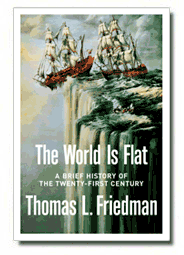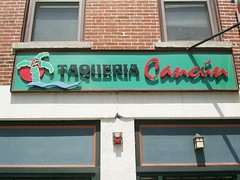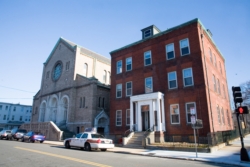
Thomas Friedman was on C-SPAN2's BookTV a short while ago on the occasion of the second anniversary of the publication of his bestselling book
The World is Flat. I haven't read the book, but I do have a general idea of the ideas in it from listening to Friedman on TV a number of times and reading some of his New York Times columns. Generally, I disagree with him.
In the anecdote that Friedman told today about the inspiration for the book, he was in India and the top guy at the top technology company there -- "the Microsoft of India," Friedman called the business -- noted that the economic playing field was getting more level. That gentleman -- "the Bill Gates of India," I guess we can call him -- is among the elite in one of the countries where the technology field is providing many jobs. On many levels that is a good thing, but the people benefiting are apparently one percent of India's population and, while that boom does extend to China (in similarly low percentages) it does not level the playing field in the ghettos of Lagos, Sao Paolo, Beijing, Paris or Detroit, as well as chunks of Central and South America, southeast Asia, the Middle East and nearly all of sub-Saharan Africa.
Friedman acknowledges some of this, and says, "We're getting there. It's a long process." In fact, "getting there" is almost certainly equivalent to "ruining the planet." For India, China and everyone else to "get there" -- or should I say "here," as in the standard of living of the United States, which we have convinced them all to strive for -- then the resources of the Earth will be chewed up and spit out. Hey, we did it, so how can we ask others not to?
Not too long ago I saw a report on TV about what happens to used computers in India. Millions and millions have been, and are being, discarded and the result is an economic disaster, with toxic chemicals being released into the air and water table. This is happening not just in India, but everywhere, and not just with computers, but with a multitude of devices that are used up and tossed aside without a second thought in our consumerist society. That is the result of "getting there."
 There is an island off the coast of Panama where the natives drink an average of five cups of unprocessed cocoa (sweetened with a little sugar) each day. The people of the San Blas Islands "appear to experience significantly lower death rates from heart attacks, stroke, diabetes, and cancer" than residents of the nearby mainland, which has convinced Dr. Norman Hollenberg, a Harvard Medical School professor, that substances in cacao -- the plant from which chocolate is made -- are loaded with health benefits.
There is an island off the coast of Panama where the natives drink an average of five cups of unprocessed cocoa (sweetened with a little sugar) each day. The people of the San Blas Islands "appear to experience significantly lower death rates from heart attacks, stroke, diabetes, and cancer" than residents of the nearby mainland, which has convinced Dr. Norman Hollenberg, a Harvard Medical School professor, that substances in cacao -- the plant from which chocolate is made -- are loaded with health benefits.























